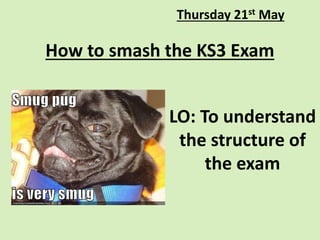
Y9 how to smash the exam
- 1. How to smash the KS3 Exam Thursday 21st May LO: To understand the structure of the exam
- 2. The structure • The exam is 1 hour 45 minutes long • The paper is split equally into reading and writing – 40 marks for each • There are 4 reading questions and 1 writing question • There will be a colour insert containing 2 sources on a vaguely related topic • How many marks available should help you decide how long to spend on each question – Just like the GCSE exam timing is crucial! • (There will be a clock if you are watchless)
- 3. BEFORE YOU START • The first task should be to read both texts you are given. • Before even looking at the questions, just get it straight in your head what is “going on.” • Try and identify the genre of each text – you may be told this if you look carefully! – consider how is each text different? No more than 15 minutes reading time just to digest the two texts
- 4. Question 1 • As the whole year group is taking this test, question 1 is designed to ease you in gently – to give you confidence and basically ensure nobody in the hall leaves with a zero. • It will test your skimming and scanning skills – can you spot information in the given source? • There will be a series of statements that you will have to decide are true or false 4 marks = no more than 4 minutes! It’s just not worth it!
- 6. Question 2 • Question 2 is a bit longer and so is worth 8 marks • There will be a similar theme to the 2 texts and you will be asked to write a summary of what is being talked about • Can you identify and interpret the information you have been given? • Top marks will involve some precisely chosen quotes used but majority of your answer will be your own words. • Inference will be required to get above 2 out of 8 - 8 marks = try around 8-9 minutes
- 7. Question 3 • Question 3 will ask you to look at one of the texts in particular, asking you how language is used for effect • This will test your knowledge of any language techniques you have learnt in forever • Words / Phrases / Language features / Language techniques / Sentence forms • You will need to analyse the choice of language, offer precise quotes and use a range of subject terminology appropriately to get the top Level 12 Marks = 12-13 minutes on this question
- 8. Question 4 • Question 4 will ask you to look at both sources – you need to compare how each text presents a particular theme • You will need to compare ideas in a perceptive way – so comparison connectives must be used – how many do you know? • Quotations must be precise and well-chosen (You get the picture by now!) 16 marks – spend around 16- 18 minutes on this question
- 9. Question 5 - Writing • Now you are onto the writing! If you are scared about timing yourself, you may think of starting with Question 5 as it is longer • however, you may want to read the reading texts first as your task will normally be on the same theme – so on this practise paper there is an animal theme! • So there may be facts or statistics that you may wish to borrow for your writing (but do not copy word for word – not so good….)
- 10. Question 5 - Writing • Question 5 will set you a statement which you will use to give your point of view – it will either be to explain or to argue your point of view. Be careful as there is a subtle difference. • To explain – to inform readers by providing facts using clear statements • Giving unbiased detailed answers • Style is linked to the given audience • Use of structural features to order your answer • Linguistic devices used for effect • Sophisticated vocabulary You will get to spend the whole remaining 45 minutes on this question – which includes time to plan it out!
- 11. Question 5 - Writing • 24 marks for content and organisation • (Is the writing interesting to read? Is it well organised? Have they used ambitious words and features?) • 16 marks for accuracy • (Spelling, punctuation and grammar) You will get to spend the whole remaining 45 minutes on this question – which includes time to plan it out!
- 12. Practise Writing task • “People become too attached to their pets. Animals are here to be useful, not to be spoilt.” • Write the text to appear on a website about the treatment of animals in which you explain your point of view on this statement.
- 13. Animals - how should they be treated? What reasons for each of the sides could you think of? We love being attached to our pets – they should be spoilt! This is a problem. Animals are here to be useful